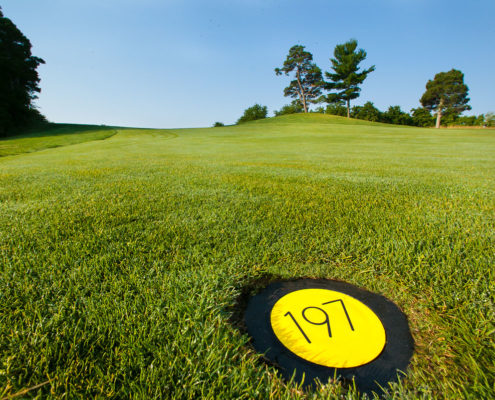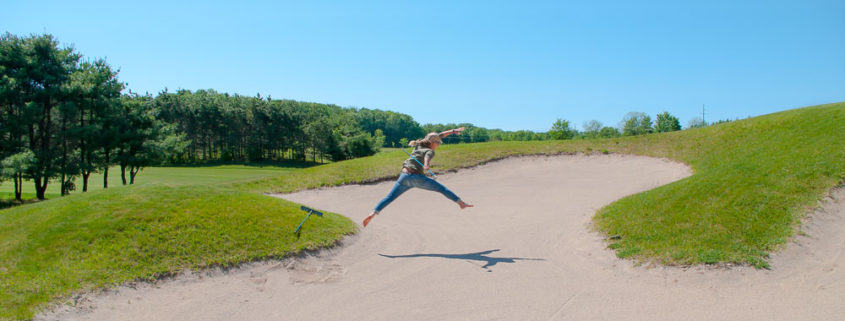Golf rules getting simpler? After centuries, it’s about time
Golf has been in decline for at least a decade. Almost every graph is down. There are not enough new young players, and too many current players quit. The game is often too slow, expensive, white, male, elitist, stuffy and full of antiquated rules. Among pros, nobody right now is Tiger, Jack or Arnie yet.
The game may even be too hard in practice, discipline and honesty to suit the age. Too much deferred, not enough gratified. Walk miles, carry a bag, hold your temper, and you don’t even get to zap aliens while gulping junk food. Lousy game.
Even the environment itself sometimes dislikes the water-greedy game. If you count in generations, golf may expire before it adapts. But that’s all old news. This is good-news day: For the first time since 1744, they’ve changed the darn rules!
The transformation is radical, wonderful and what millions of us, playing for two bucks and picking up after we reached “quad,” have been doing all our lives.
Golf is hard enough without some 15th-century shepherd deciding that it’s a two-stroke mortal-sin penalty if your putt hits the flagstick while it’s in the cup. Or if your ball moves a hundredth of an inch as you address it, visible on slow-motion replay, as happened in both the men’s and women’s U.S. Opens last year. Dustin Johnson survived his kerfuffle; Anna Nordqvist lost a title.
On Wednesday, the USGA and Royal & Ancient released the result of their five years of study, bless ’em. They came up with suggestions, to be discussed throughout golf for the next two years, that almost every man or woman, public course or private, that I’ve played with regularly has already discussed or employed all their lives.
[Golf rolls out what may be most sweeping rule changes since 1744]
Once, I went 36 holes with Roger Clemens and Andy Pettitte of the Yankees. Darn, I said, so you guys play by common sense, too — not strict Rules of Golf.
It’s as if the rest of us had three open holes behind us but the folks who run golf had to get scared of falling profits, popularity and ratings before they decided to catch up. So, once every 283 years, they’re “in place.”
You’re not going to believe what the ruling bodies now endorse! Actually, you will. Half of it you already do. The other half you wish you could. Soon, we all can — and without telling each other, “Shhhh, don’t tell anyone we play that way.”
Hit when you’re ready, not just when you’re “away.”
Don’t search for that stupid ball for five minutes. Three is enough. Move on.
If someone in your group doesn’t hit after 40 seconds with clear fairway in front of them, say, “While we’re young.”
Want to remove a loose impediment in a bunker? Sure. They’re “loose” for a reason. Is something messing up the green on the line of your putt — spike marks, ball marks, whatever? Well, fix it. You stoned it to six feet. You deserve a smooth putt.
Who cares if you hit the flagstick with a putt or accidentally ground your club in a bunker if you aren’t hitting a shot? Two-shot penalties, my foot.
If your drive embeds in the soggy rough, pull it out; for the price you’re paying to play, that ball should bounce. And if you accidentally move your ball while searching for it, that’s not a penalty — are we supposed to be psychic?
Apparently, I’ve been ahead of the times for decades. I thought I was just begging my friends to understand and forgive me. When I took a drop on a hill, I didn’t hold my arm out at shoulder height like a dope and drop the ball twice to prove that gravity still works (while my ball rolled down a gulch). I held it an inch above the ground and kind of “drop-placed” it. Now, that’s the new rule.
Most important, I haven’t counted all my strokes. I’ve played in very few groups that do; we seldom take more than a quadruple bogey. Right up until that putt for triple, grind it out. After that, pick up — not out of pity for yourself but out of mercy for everyone else behind you on the course. The new rules say: Define a max score — twice par, triple par, whatever — and don’t keep beating the poor ball after you reach it.
(Exception: The only time I ever played Pine Valley, the hardest course in the world, we all decided we would count every stroke. So, I asked the caddie to read my putt for a 10. He said, politely, “Sir, I don’t line ’em up for double digits.”)
All golfers wail at the game’s gods. But now we’re actually getting divine answers. When you hit the ball into jungle or lava, why are you expected to go in after it? Why not just let us play it like a water hazard? Now, or soon, we can.
Why should we ever have to hit a ball across the same water twice? Why shouldn’t all courses, when possible, be allowed to treat all water as “lateral.” Just let us drop beside the water, not behind it again. That change is suggested, too.
Why can’t we ground our clubs in hazards if we aren’t trying to cheat by “testing the conditions” and we aren’t attempting a shot? That’s as insane as getting a two-shot penalty because you point at your target line on the green and accidentally touch the grass. Both have been penalties since 1744, but not now.
I may have misstated some wrinkles in these new rules. I wasn’t much good on the old ones. I’ve loved the game all my life, but the 97 pages of basic Rules, plus 457 more pages of “Decisions on the Rules of Golf” — no, not so much, personally.
To me, these belated rules are fabulous. Tour pros who think it’s all about them, not the health of golf, may complain. So might Oldest Members, who also know the codicils in their home owners association bylaws. Let’s steamroll ’em.
Golf has tough issues, some outside its control. But this one’s right in its grip. The game is hard enough. And its honor code adds a second layer of discipline and difficulty. That’s good. But incomprehensible and unnecessary rules are not.
I don’t know what to do first: ground my club in a bunker or hit the flagstick with a putt. And not get a penalty. New rules — let’s flaunt ’em. Why, it’s almost enough, on a winter day, to make you want to go out and . . . play golf.





Comments are closed.